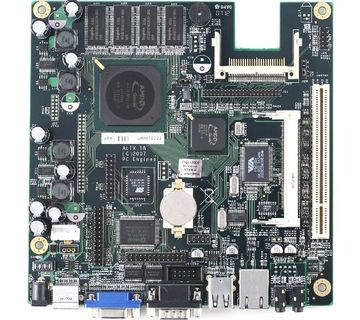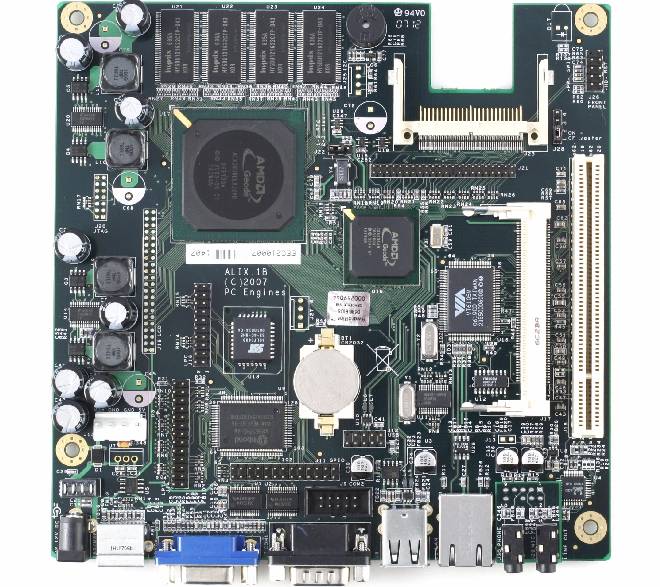Uit Hack42
< Gebruiker:BugBlue
Versie door BugBlue (overleg | bijdragen) op 14 mrt 2011 om 18:55 (→Code or it didn't happen: Is it me or mediawiki)
| Project: ESpaceState | |
|---|---|
| Naam | ESpaceState |
| Door | BugBlue |
| Status | Uitvoer |
| Madskillz | solderen, C coden, GPIO, docs lezen, schroeven, spijkeren, debuggen |
| Doel / Omschrijving | |
| GPIO switches misbruiken om status van de space te detecten | |
| Alle Projecten - Project Toevoegen | |
De Alix.1C barPC heeft mplayer, aplay, en 21 GPIO switches pins. Deze pins kun je misbruiken om hier en daar wat uit te lezen als je er een switch tussen zet.
Op dit moment zijn er 2 deuren voorzien van microswitches en 1 deur van bekabeling hiernaartoe.
De code draait als root op de barPC omdat het iets van privs nodig heeft op I/O ports. Chip docs op http://www.itox.com/pages/support/wdt/W83627HF.pdf
Code or it didn't happen
/* ALIX 1C GPIO reader and handler. Contains bugs. Guaranteed! */
/* TODO:
* player script in the background
* stupid output from scripts (or failure to start) to /dev/null
* Don't just copy-paste code but make a nice function for it.
* Get rid of BugBlue signatures, they are ugly
*/
#include <sys/io.h>
#include <stdio.h>
#include <stdlib.h>
#include <time.h>
#include <unistd.h>
#include <signal.h>
#define PORT_INDEX 0x2e
#define PORT_DATA 0x2f
#define DEBUG 0
typedef unsigned char BYTE;
const char* toBin(const BYTE c)
{
static char buff[9];
BYTE mask = 128;
int i=0;
while(mask)
{
sprintf(buff+i++, mask & c ? "1" : "0");
mask >>= 1;
}
sprintf(buff+i, "%c", '\0');
return buff;
}
void init()
{
outb_p(0x87, PORT_INDEX);
outb_p(0x87, PORT_INDEX);
}
void done()
{
outb_p(0xAA, PORT_INDEX);
}
void set(BYTE idx, BYTE val)
{
outb_p(idx, PORT_INDEX);
outb_p(val, PORT_DATA);
}
BYTE get(BYTE idx)
{
outb_p(idx, PORT_INDEX);
return inb_p(PORT_DATA);
}
/* Time to move away */
void leave(int sig) {
done();
exit(sig);
}
<code>
int main(int nargs, char **argv)
{
int test1;
int test2;
BYTE byte = 0;
struct tm *local;
time_t t;
t = time(NULL);
(void) signal(SIGKILL,leave);
iopl(3);
init();
// check if OK - must be 0x52
byte = get(0x20);
if(DEBUG) printf("0x52 = [0x%02x] (%s)\n", byte, toBin(byte));
// check if GPIO11 is active
byte = get(0x2a);
if(DEBUG) printf("CR2A = [0x%02x] (%s)\n", byte, toBin(byte));
// set (and get) logical device to #7 - GPIO1 (GP10-17)
// GPIO next = #8 (GP20-26)
// GPIO next = #9 (GP30-35)
const BYTE devIdx = 0x07;
set(devIdx, 0x07);
byte = get(devIdx);
if(DEBUG) printf("LOGICAL DEVICE# = [0x%02x] (%s)\n", byte, toBin(byte));
// check GPIO1 functions [1:input, 0:output]
const BYTE funcIdx = 0xf0;
byte = get(funcIdx);
if(DEBUG) printf("FUNCTION = [0x%02x] (%s)\n", byte, toBin(byte));
// GPIO1 data
// Natuurlijk is GP10-17 (1 = open) GP20-26 (0=open) en GP30-35 (0=open)
const BYTE dataIdx = 0xf1;
int ot1=0,ot2=0;
while(1) {
byte = get(dataIdx);
local = localtime(&t);
if(DEBUG) printf("DATA = [0x%02x] (%s)\n", byte, toBin(byte));
test1 = 1 & byte;
if(test1==0 && ot1==0) {
printf("%s Voor-tussendeur is open\n",asctime(local));
system("./1-open.sh");
ot1=1;
} else if(test1!=0 && ot1==1) {
printf("%s Voor-Tussendeur is closed\n",asctime(local));
system("./1-close.sh");
ot1=0;
}
test2 = 2 & byte;
if(test2==0 && ot2==0) {
printf("%s Achter-tussendeur is open\n",asctime(local));
system("./2-open.sh");
ot2=1;
} else if(test2!=0 && ot2==1) {
printf("%s Voor-Tussendeur is closed\n",asctime(local));
system("./2-closed.sh");
ot2=0;
}
usleep(200000);
}
exit(1); // WTF do we do here?
}

